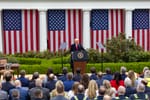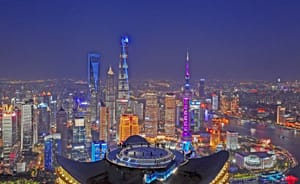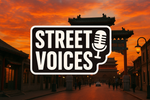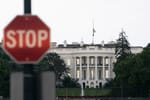By Wang Mengqiao
On April 2 local time, U.S. President Donald Trump declared a national emergency and signed two executive orders introducing so-called "reciprocal tariffs." Beginning on April 9, the United States imposed sweeping tariffs on major economic players--including China, the European Union, and Japan. Within days, markets were thrown into turmoil, and public debate became intensely heated. Then, almost theatrically, Trump reversed his decision by announcing a 90-day suspension of the tariffs for those countries that had not taken retaliatory measures.
This abrupt policy reversal from the leader of the world's foremost power raises pressing questions: How did an electoral spectacle result in a government led by a team with significant professional shortcomings? And why have the checks and balances--designed to maintain equilibrium among the legislative, executive, and judicial branches--proved so ineffective against such presidential caprice?
The Alienation of Electoral Politics:
At its core, the rise of Trump and his inner circle signaled a triumph of anti-elitism and anti-intellectualism. In earlier eras of American electoral politics, a candidate's professional competence was a key criterion for voters. However, persistent economic imbalances have reshaped public expectations, increasingly valuing political identity over administrative expertise.
Following the 2008 financial crisis, low- and middle-income Americans saw their living standards decline sharply and came to attribute their economic hardships to collusion between transnational corporations and politicians. As trust in conventional political elites plummeted, Trump's "Make America Great Again" platform, with its anti-elite and anti-globalist rhetoric, gained broad appeal.
By reducing the complexities of economic restructuring to a populist and protectionist narrative, Trump presented a simplified diagnosis that resonated widely. His status as a "political outsider" and his unconventional appointments were seen not as liabilities but as a necessary disruption to entrenched bureaucratic interests, garnering significant support among those disillusioned with the system.
The logic of "identity over competence" has deeply reshaped American electoral dynamics. For many voters, casting a ballot now serves more as a political statement of group identity than as a rational evaluation of a candidate's capability in policymaking. In this context, the traditional emphasis on a leader's professional qualifications has diminished as a prerequisite for the legitimacy of political power.
Many observers note that Trump's dramatic push for "reciprocal tariffs" was little more than a political performance--an effort to apply maximum pressure in order to secure concessions from trade partners. When major economies such as China and the EU responded with firm countermeasures, the strategic shortcomings of the Trump administration's grasp of global trade dynamics became starkly apparent.
Intended as a coercive instrument to gain negotiating leverage, the tariffs quickly morphed into a high-stakes gamble that risked domestic economic harm in exchange for an illusory display of strength abroad. With economic consequences mounting, Trump reversed his decision within a day, announcing a 90-day suspension of the new tariffs for nearly 60 countries.
Loopholes in the System of Checks and Balances:
Frequent policy reversals and impulsive decision-making have characterized much of Trump's time in office. Even as these missteps revealed the lack of expertise within his team, it remains perplexing why America's political institutions failed to check and balance such erratic behavior.
One factor lies in Trump's adept use of institutional loopholes. Since assuming office, he has relied heavily on executive orders to bypass in-depth debate in Congress--a practice sometimes labeled "rule by executive order." While such orders are seldom overturned by either Congress or the Supreme Court, they remain theoretically subject to legal challenge. However, for a policy as far-reaching as his tariff initiative, which threatened to upend the global trading system-executive orders alone did not suffice to avoid legislative oversight.
Instead, the White House employed an even more "efficient" legal strategy: declaring a national emergency under the National Emergencies Act (NEA) of 1976 and invoking the International Emergency Economic Powers Act (IEEPA) of 1977. This legal framework enabled the president to sidestep widespread criticism and quickly launch an aggressive tariff policy.
Notably, the NEA does not clearly define what constitutes a "national emergency," nor does it detail the specific measures a president may take in response. This legal ambiguity grants the executive branch sweeping discretionary powers. Once an emergency is declared, a president wields extraordinary authority that typically bypasses the checks normally imposed by Congress.
Historically, emergency powers have been reserved for genuine crises and used to expedite decision-making and overcome partisan gridlock in moments of national urgency. Yet, in this instance, rather than responding to an unforeseen crisis, Trump exploited the act's vagueness by framing his politically contentious policy as a matter of urgent national concern. In doing so, he dramatically expanded his presidential prerogatives under the guise of crisis management--a maneuver that exposes a fundamental vulnerability in America's system of checks and balances: the risk of loosely defined legal frameworks being manipulated for partisan or personal ends.
Overestimating External Threats and Underestimating Internal Flaws:
Trump's ascent and tenure highlight a persistent paradox in the policymaking of the U.S. government in the past few decades: an intense focus on external threats coupled with a startling blindness to domestic systemic vulnerabilities.
For decades after the Cold War, the United States enjoyed an unrivaled position on the global stage, a status that fostered deep confidence in its domestic institutions and a hegemonic worldview in foreign policymaking. American neoliberal political elites, convinced of their system's superiority, have long guarded against perceived international adversaries by deploying military deterrence, technological barriers, and economic sanctions to suppress any challenge to the U.S.-dominated order.
However, this overconfidence in the domestic system led many to overlook the dangers of a leader exploiting systemic weaknesses. In just a few short months, Trump inflicted damage on the global free trade system that surpassed the disruptive actions of any post-Cold War external adversary. This miscalculation--overestimating foreign threats while underestimating internal institutional flaws--set the stage for his disruptive presidency.
Trump's rise has not only signified the onset of a broader populist surge but also the reemergence of protectionist policies. Billionaire hedge fund manager Bill Ackman, who supported Trump in the 2024 presidential election, took to social media to compare the tariff policy to an "economic nuclear war." His stark warning raises an urgent question: Can America's much-touted institutional safeguards actually avert this looming crisis?
Wang Mengqiao is an Assistant Professor in the School of International Development and Cooperation, University of International Business and Economics (UIBE), China. The views don't necessarily reflect those of BeijingReviewDossier.
The original Chinese version of this article was first published in Beijing Daily on April 11.








